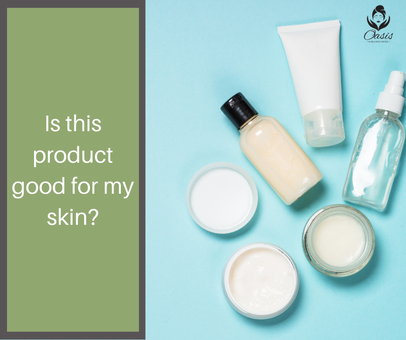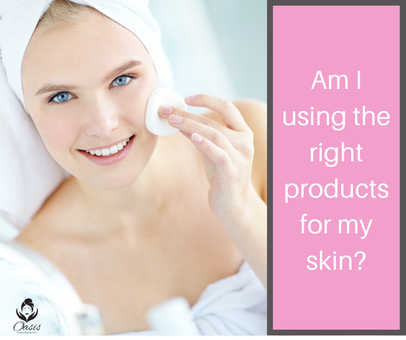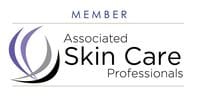 Skin care products that you typically find at your local pharmacy or convenience store are often well-designed and their packaging conveys a sense of effectiveness at a low price. These products are often less expensive than what you would see a professional skin care consultant use. Products you purchase from your esthetician are generally far more expensive than what you find in the department store. In one sense, purchasing lots of different cheaper skin care products gives you a greater opportunity to find a diamond in the rough. You might find something that actually works for your particular skin situation. But most of the time, products you find in stores are usually not effective for most people's conditions. In the end, you might find that only 10 or 20 percent of the products that you purchase are actually effective for your specific situation. If that’s true you could say you actually spent far more money to find a product that works than if you had gone to your skin care professional and just asked to buy what is best for you. So, one way to look at purchasing professional quality skin care products is to think of it as an investment in your skin, health, and beauty. When you combine high quality products with high quality clinician care, you receive results that you can count on which allows you to stop searching for answers and focus on other important matters. Working with your esthetician over the course of time helps them to really dial in your results and gain an understanding of your specific skin situation. Receiving a carefully tailored service allows your skin to receive the maximum benefit and care. If you focus on establishing a history with your clinician, this allows them to understand all of your skin’s preferences as well as your overall health background and your goals. All of these things work together to ensure that your treatments are as valuable as possible and that your results are far more stable and predictable. Labeling Difficulties. When you go to a department store or pharmacy and see the products that are available for skin care, it is typically not quite clear whether what you are looking at is a product of marketing or whether it is scientifically based. Your skin care professional, however, can help you decipher what the product benefits are and what the ingredients within the products may do to your skin. The amount of training that goes into becoming an esthetician ensures that their knowledge of how your skin could interact with a variety of popular over-the-counter ingredients is vast. They will know far more than a person who works at a department store makeup counter area or even pharmacy will know. On top of that, they will also know how the ingredients interact with you specifically. Estheticians are required to receive continuing professional education on a regular basis which allows them to learn about an astounding array of tools to determine what your specific situation calls for. Diagnostic tools such as imaging devices, scanners, or wood lamps, can help identify your skin type and develop a plan that is tightly coupled with the treatment you will receive to meet your goals. Estheticians create a plan to assess the issues, log and document their findings, develop a treatment plan, and track effectiveness against certain goals over time. This is a level of service that simply cannot be attained even over multiple visits to over-the-counter product sellers. Convenience Factor Since we are always concerned about anything that we can do to enhance and protect our looks, it makes sense that we often fall prey to good advertising that speaks directly to our needs. This is why we often make purchases on the fly while we happen to be in a drugstore or department store looking for toothpaste. Making the occasional purchase of a product that is promising a breakthrough in some area of skin care that you deem important is not going to cause your skin care regimen to go off the rails. But if you find a hot new product that is promising the Moon and it contains ingredients that you are not 100% sure of then be sure to make a note of the ingredient you don't recognize and ask your skin care professional about it.  Price vs. Value Some people make the argument that skin care products sold by skin care clinics are often just the same products that you can find in a department store, but with a heavy profit markup. If this were true then it would be very easy to simply do a Google search for the manufacturer of both the cheaper and the more expensive products and then talk to the manufacturer. In almost all cases however, you will find that companies that mass-produce products that sell in department stores or drug stores simply do not cater to clinicians. For them, it is far more profitable to mass-market their products on television and spend money creating packaging that makes people want to purchase rather than creating something that actually works. Don't get me wrong, these large companies actually do know what works. However, they realize that most consumers are not willing to put the effort, time and money into finding out what really works for their particular situation. On the other hand, pharmaceutical manufacturers who work specifically with skin care clinics understand that their product profits come from producing something that actually works, and selling to people who have the skill to make it work. Most skin care products by themselves will only be a partial solution to the average person. But when combined with the care from a skin care professional, everything can work synergistically to produce excellent results. This is why estheticians and their services seem to cost more than products you are able to cobble together on your own from a drugstore or department store. So we come back to the old adage “you get what you pay for”. And in the end, isn't your skin really worth paying a little more to eliminate guessing games? It should be. After all, it's the only skin you've got. |
Details
Archives
July 2024
|
- Home
- About Us
-
Services
- Oasis Membership
- Oasis Skin Analysis and Consultation
- Age Management Facials
- Procell MicroChanneling
- Skin Classic
- Massage
- Ultimate Oasis Body Molding Service
- CryoSkin 3.0 Body Treatments >
- BioSlimming Body Wrap
- Solo Sauna Blanket
- Relaxation Station
- Hair Removal Wax Services
- Lash & Brow Enhancements
- Classes
- Recommended Providers
- Products
- Blog
- Gift Cards
- Payment Plans
- Book Now
|
Contact Information
Oasis Skin & Wellness Clinic Inc. 707 Walnut St Murphysboro, IL 62966 [email protected] Call or Text (618) 207 - 4404 |
|
Subscribe Today
Subscribe to our Leading Lady Newsletter today and receive exclusive offers and updates on "The Oasis Happenings" and helpful tips to improve your skin. |
